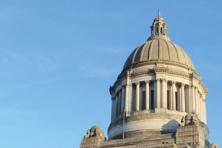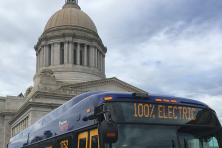The work we do in Washington State has now reached a new level of importance and taken on an even greater urgency. If the incoming Trump administration really does mortgage our country’s national leadership on climate, America’s only hope for staying on track for our carbon reduction goals will depend on ambitious, thoughtful, and comprehensive action from states and local jurisdictions across the country. It has never been more important to focus on state action than now.
Without question, the new administration places a variety of the Obama administration’s signature policy achievements in clear and present danger. This is certainly true of climate action where core policies like the Clean Power Plan, designed to reduce power sector emissions by 32% by 2030, is under attack. The international Paris climate accords are at risk, as well as a number of lesser known rules that hold the coal industry responsible for its smog-creating, health-destroying pollution.
This isn’t an academic conversation—the longer we delay acting, the more people are at risk of profound climate harm including droughts, forest fires, and extreme weather that challenge lives and livelihoods.
The good news is that Washington is well-positioned not just to achieve deep reductions in carbon pollution, but also to reap significant economic benefits while creating momentum and models for other states to accelerate climate action. Here is what we can do right now:
Transform transportation: Washingtonians spend more than $12.5 billion every year to pay for gasoline and diesel to fuel our cars, trucks, and buses. All that money pays for nearly half of Washington’s greenhouse pollution, while dumping dangerous air pollutants into communities across the state, especially those that are already disadvantaged. Fortunately, green electricity costs 1/3 the price and is often supplied by local generation that keeps more of our dollars in Washington. The technology is ready, and leaders on both sides of the aisle in Olympia have expressed support for electrifying our transportation system.
Washington is slated to receive $103 million to invest in solutions to mitigate further environmental damage and public health consequences caused by Volkswagen’s fraud. Instead of investing that money into diesel engines that are only marginally cleaner, we can prioritize it to dispense with oil once and for all. We must expand incentives that already exist for cars to buses and trucks, and help increase utility involvement in the transportation sector.
We also need to help residents get around with less reliance on cars. Voters in Puget Sound and in Spokane just passed major new public transit investments, proving that Washingtonians not only understand the value of clean transportation—they’re ready to invest in it, too.
Stop unnecessary investments in fossil fuels: Big fossil is still trying to build massive coal and oil facilities in the Northwest, which would lead to more dangerous coal and oil trains running through our communities and hundreds of millions of dollars being spent on fuels we just can’t afford to burn anymore. Most of these facilities proposed in the last few years have already been rejected because of the incredible dangers they pose to human health and safety, with more rejections surely ahead.
Thanks to a legacy of hydropower and the renewable energy and efficiency standard passed by voters in in 2006, we have also helped create over 100,000 local clean energy jobs. So why do utilities in the region continue proposing new natural gas facilities? We can maintain a reliable grid while eliminating most, if not all, of these projects—and we should.
Fund unprecedented investment in clean energy and climate adaptation, paid for by the polluters causing climate change: Great local companies like OneEnergy Renewables, EnergySavvy, and Itek show the promise of clean tech industry in Washington. The Washington operations of Kaiser Aluminum, Nucor Steel, and BMW are world leaders in clean manufacturing. We should invest in helping these businesses become even cleaner and more efficient, while also devoting resources to clean water systems and forest health jeopardized by climate change.
These kinds of investments are absolutely indispensable if we hope to address fossil fuel emissions and the inequitable harm they cause, and we can raise the money by levying a new tax on the same carbon pollution that damages our health and our planet.
The Alliance for Jobs and Clean Energy, a consortium of communities of color and people with lower incomes, labor, environmental groups, faith communities, health professionals, and advocates for women and families, is working on just such a proposal, and we’re committed to sitting down with business and the many other engaged voices to make it happen.
Addressing climate change is about so much more than averting disaster—it’s about investing in our communities, in our economy, and in our public health. As the federal government doubles down on yesterday’s fuels, states and local governments are now our firewall. We must act.





